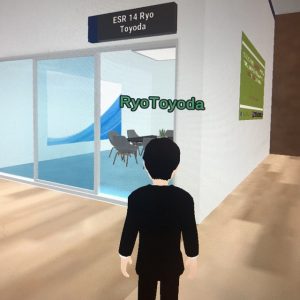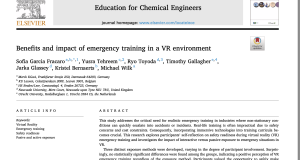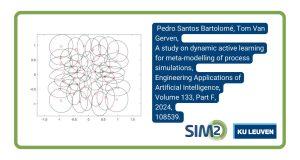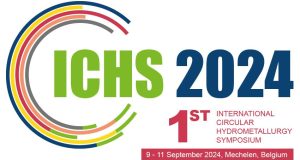On the 4th of October, 2022, Ryo Toyoda has obtained his PhD at Newcastle University by defending his thesis entitled “Assessing chemical industry employees using immersive virtual environment”. Ryo was Early Stage Researcher (ES14) in the CHARMING project. He was promoted by Prof. Jarka Glassey (UNEW). Ryo is currently working as Project Manager at IT/VR consulting firm in Tokyo, Japan.

A summary of the thesis, as well as a list of Ryo’s publications are available below:
The highly complex nature of chemical process industry necessitates regular, updated, and relevant training for chemical operators to ensure that they are equipped to perform their functions. Hence, this study proposes the use of immersive virtual reality (IVR) in chemical industries, as they can facilitate effective training in a safe and controlled environment. Following the rapid advancement and growing market of IVR, it becomes necessary to develop an unbiased, and unobtrusive assessment design in this environment. The literature review conducted in this study suggests that VR-based health and safety training, vis-à-vis the conventional methods, is more effective in developing and enhancing the reaction, learning, and behavioural levels of trainees. As to the behavioural intention to adopt IVR, data collected and analysed from 438 respondents, who were grouped according to prior IVR experience, nationality, and length of work experience, shows no statistically significant differences among the groups. Since there is lack of development of a systematic assessment framework that is tailored-fit for IVR, this study proposed an assessment structure incorporating and harmonising appropriate methodologies. The proposed framework uses Dreyfus model, which provides for the progression of a novice to expert, incorporates evidence-centred design (ECD), to provide logistical and evidentiary links from collected data to the desired evaluation construct, and integrates fuzzy comprehensive evaluation method to further enhance the resolution of levels in Dreyfus model. This framework was tested and validated through an IVR-training prototype called ‘Operate Your Own Reactor’, which was specifically created for this study, in ACTA (Belgium). Lastly, the study discovered that in terms of attitude, satisfaction based on content, and behavioural intention, there are no significant differences whether trainees are presented with simplified or detailed assessment results. Nonetheless, trainees are found to prefer the latter as it helps them improve further.
A list of peer-reviewed publications in scientific journals and conference proceedings:
- C. Udeozor, R. Toyoda, F. Russo Abegão, J. Glassey, Perceptions of the use of virtual reality games for chemical engineering education and professional training, Higher Education Pedagogies, 2021, DOI:10.1080/23752696.2021.1951615, download
- R. Toyoda, F. Russo Abegão, S. Gill, J. Glassey, Drivers of immersive virtual reality adoption intention: a multi-group analysis in chemical industry settings, Virtual Reality, 2021, DOI:10.1007/s10055-021-00586-3, download
- C. Udeozor, R. Toyoda, F. R. Abegao, J. Glassey, Digital games in engineering education: systematic review and future trends, European Journal of Engineering Education , 2022, DOI:10.1080/03043797.2022.2093168
- R. Toyoda, F. Russo Abegão, J. Glassey, VR-based health and safety training in various high-risk engineering industries: a literature review, International Journal of Educational Technology in Higher Education, 2022, DOI:10.1186/s41239-022-00349-3, download
- R. Toyoda, F. Russo Abegão, S. Gill, J. Glassey, Perceptions of Professional Chemical Engineers toward Immersive Virtual Reality in Health and Safety Training, The 8th European Conference on Education, 2020, 273-284, download
- Y. Tehreem, S. Garcia Fracaro, T. Gallagher, R. Toyoda, K. Bernaerts, J. Glassey, F. Russo Abegão, S. Wachsmuth, M. Wilk, T. Pfeiffer, May I Remain Seated: A Pilot Study on the Impact of Reducing Room-Scale Trainings to Seated Conditions for Long Procedural Virtual Reality Trainings, 8th IEEE International Conference on Virtual Reality (ICVR) 2022, 2022, DOI:10.1109/ICVR55215.2022.9848222, download






